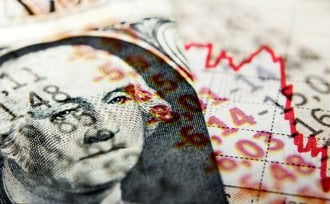The coronavirus crash has decimated stocks, but the real risk is that the coronavirus could cause a recession. That's where investors need to focus their attention right now. Stocks simply aren't going back up until the economy recovers.

The textbook definition of a recession is two consecutive quarters of negative GDP growth. But that's just how economists tried to define an event everyone knows when they see it. In reality, a recession is vicious cycle where business slows, jobs are cut, families cut back on spending, and then even more business slows as customers dwindle.
While we might not hit the technical definition of a recession, Americans are already experiencing the effects of one.
If you're a small business owner whose customers are staying home, you don't care if this meets the definition of a recession. It sure feels like one to you. And if you're an employee whose job is on the line as business slows, it certainly feels like a recession.
Goldman Sachs Group Inc. (NYSE: GS) projects unemployment claims will spike from 281,000 to 2,250,000, which would be the biggest jump ever.
That's important, because stocks won't recover until the economy does. If you're looking for a stock market bottom or looking at this as a buying opportunity, remember that we'll be seeing doomsday numbers for at least another quarter. And don't forget, the next round of earnings calls will be brutal.
But there's a silver lining.
We could see a bounce back sooner than usual, even though the coronavirus is slamming the economy right now. Recessions can last for years. The last recession lasted a full 18 months. But it's possible this one will end as soon as Americans feel safe to go back to their old routines. That could be weeks from now.
In fact, that's what the experts are predicting...
Are We in a Recession Right Now?
[mmpazkzone name="in-story" network="9794" site="307044" id="137008" type="4"]
While we won't know the official numbers for a while, we're certainly in a recession. GDP growth rate came in at just 0.4% to end 2019. With the already visible economic impact from the coronavirus, it's a safe bet that the economy is currently shrinking.
What we don't know is just how severe the decline is. Economists are projecting some staggering numbers for Q2. Take a look at four predictions in the table below...
| Quarterly GDP Growth Predictions | ||||
| Deutsch Bank | UCLA | JP Morgan | First Trust Advisors | |
| Q1 | 0.6% | 0.4% | -4% | -1.5% |
| Q2 | -12.9% | -6.5% | -14% | -20% |
| Q3 | 4% (average) | -1.9% | 7% (average) | +3% |
| Q4 | 4% (average) | 4% | 7% (average) | +3.5% |
Some projections are even more dire. Goldman Sachs is projecting a 24% plunge in GDP during Q2.
This will get worse before it gets better.
But you can see the light at the end of the tunnel in the table, too. Once the worst is over, every expert we found is predicting a swift and strong recovery by the end of the year. As long as social distancing and isolation work to slow the spread of the pandemic, and if fiscal stimulus measures like the $1,000 checks Congress is debating help keep Americans solvent, then we could see a return to normalcy quickly.
In short, the recession will be severe, but it will be short-lived.
We can expect to see a bottom in stocks sooner than later too. Once reports show the pandemic is on the wane, we'll start to see optimism creep into the markets. And once businesses start reporting operations are mostly back to normal, we'll see a frenzy of buying.
Starbucks Corp. (NASDAQ: SBUX) and Apple Inc. (NASDAQ: AAPL) are already re-opening stores in China, where the crisis originated. That's an encouraging sign that things can bounce back quickly.
That doesn't mean this is a wide-open buying opportunity right now. Timing the market is a fool's errand, and we could be a long way from the bottom.
But you can mitigate the uncertainty with dollar cost averaging. Instead of entering positions all at once, use just 20% of your cash to buy in. Use 10-20% more each month until the upswing is here. You'll be buying on the way down, but your average price will be close to the market bottom, giving you the biggest potential gains once the rally kicks in.
And if you need even more insight into what the coronavirus means for your money, including what you can do about it, we're making our special report totally free to our readers right now. Just go here to get your copy.


